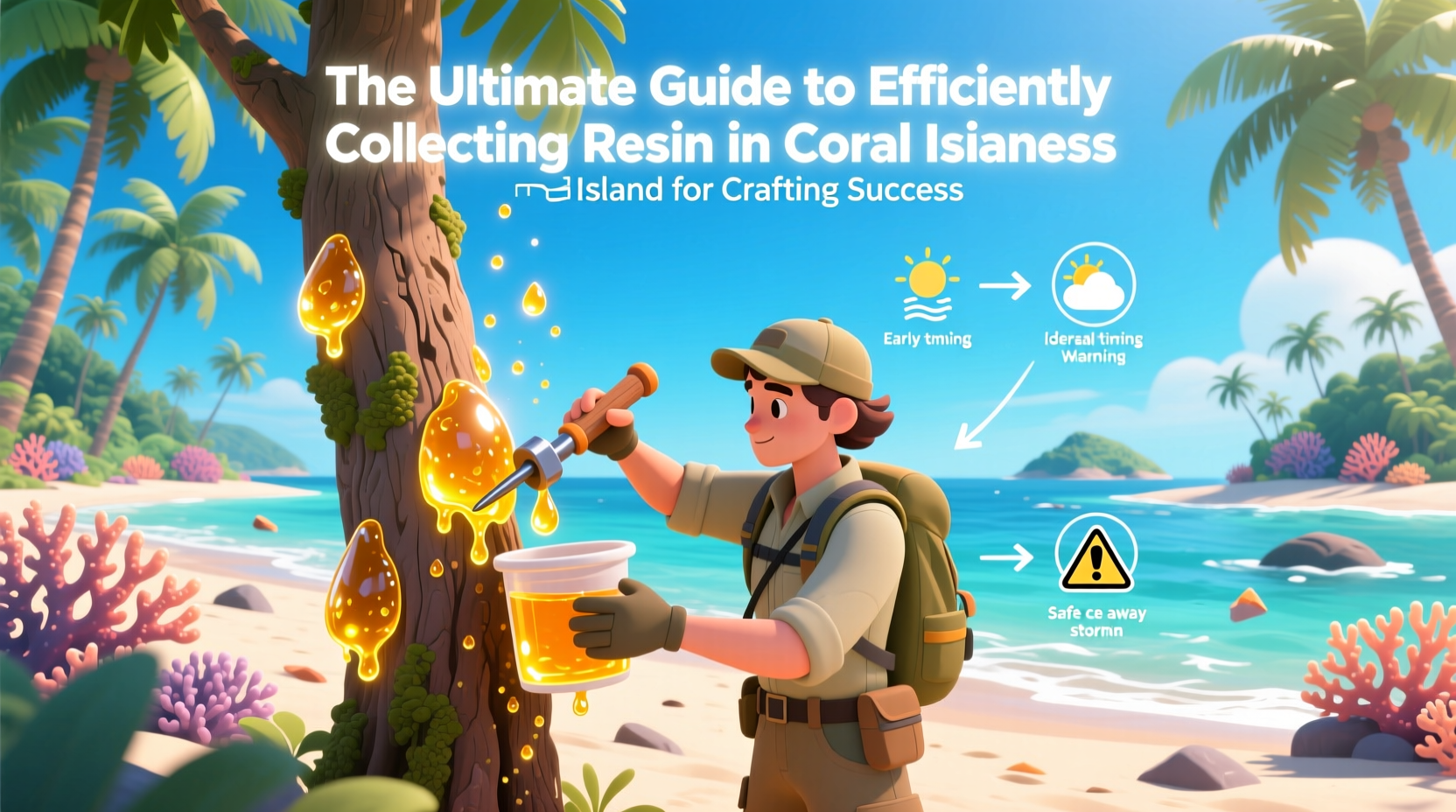In the vibrant world of Coral Island, resin is more than just a sticky substance tapped from trees—it’s a cornerstone of progression. Whether you're building tools, upgrading equipment, or crafting decorative items, resin plays a vital role across multiple crafting disciplines. Yet, many players overlook its long-term value or collect it inefficiently, missing out on valuable time and materials. Understanding how to gather resin strategically can dramatically accelerate your crafting capabilities and overall farm development.
This guide breaks down every aspect of resin collection: where to find it, how to harvest it efficiently, ways to automate the process, and how to use it most effectively in crafting. By mastering these techniques, you’ll turn an often-overlooked resource into a powerful engine for advancement.
Understanding Resin and Its Crafting Applications

Resin in Coral Island is harvested primarily from tapping Rubber Trees scattered across the map. Once collected, it becomes a key ingredient in numerous recipes, especially those involving advanced tools, machinery, and structural upgrades. Unlike common resources such as wood or fiber, resin cannot be farmed directly—it must be gathered from wild trees or purchased occasionally from vendors.
Common uses include:
- Upgrading water pumps and sprinklers
- Crafting greenhouse components
- Building bee houses and apiaries
- Creating fertilizer accelerators and irrigation systems
- Manufacturing high-tier construction materials
Because resin enables access to mid-to-late game infrastructure, early and consistent collection provides a compound advantage. Players who stockpile resin during the first few seasons often reach automation milestones significantly faster than those who neglect it.
“Resin is one of the most underutilized resources in the early game. A steady supply can shave weeks off your tech progression.” — Lena Park, Coral Island Speedrun Record Holder
Locating and Tapping Rubber Trees Efficiently
Rubber Trees are permanently located throughout Coral Island, primarily in forested zones outside the main village. Key areas include the Jungle Path, Mountain Trail, and regions near the Quarry. There are exactly 30 Rubber Trees in the game, each capable of producing resin every 2–3 days when tapped.
To tap a tree, approach it and select the “Tap Tree” option using a Knife (available from Pierre’s shop). Each tap yields 1–2 units of raw resin and lasts for 48 in-game hours. After that window, the tree must be re-tapped.
For maximum efficiency, plan your daily routes to pass by clusters of Rubber Trees. For example, if you’re heading to the Mountain for mining, route through the adjacent forest patch to tap nearby trees. Over time, this habit eliminates wasted trips and ensures no tree goes untapped for more than a day past its cooldown.
Optimal Resin Collection Schedule
Since each Rubber Tree regenerates its resin after two full days, maintaining a rotating schedule is essential. Random tapping leads to missed opportunities and inconsistent supply.
A strategic approach involves dividing the 30 trees into three groups of ten and tapping one group per day. This creates a continuous cycle:
- Day 1: Tap Group A
- Day 2: Tap Group B
- Day 3: Tap Group C
- Day 4: Return to Group A (now refreshed)
This method guarantees a daily harvest of approximately 10–20 resin units, depending on drop variance, and prevents overlap or forgotten trees.
Sample Weekly Resin Schedule
| Day | Tapped Group | Expected Yield | Recommended Route |
|---|---|---|---|
| Monday | Group A | 10–20 Resin | Jungle Path + Farm Entrance |
| Tuesday | Group B | 10–20 Resin | Mountain Trail + Quarry Edge |
| Wednesday | Group C | 10–20 Resin | West Forest + Near Beach Cliffs |
| Thursday | Group A | 10–20 Resin | Repeat Monday route |
Use the in-game calendar to mark tapping days or keep a physical notepad. Consistency turns resin collection from a chore into a seamless part of your routine.
Advanced Strategies: Automation and Storage
While manual tapping is unavoidable, you can reduce labor over time. Once you unlock the Botanist specialization (found under the Nature skill tree), you gain the ability to craft the Auto-Tapper—a device that automatically collects resin from a single tree every 48 hours.
To craft one, you need:
- 5 Resin
- 3 Iron Ingots
- 2 Glass
- 1 Screw
Deploy Auto-Tappers on high-traffic trees or those along your regular path. Although limited to one per tree, placing even five tappers frees up significant time. Prioritize trees closest to your farm or frequently visited zones to minimize retrieval effort.
For storage, designate a chest near your workshop specifically for resin. Label it clearly in your inventory system to avoid accidental usage in low-tier crafts. Given its long-term value, treat resin like a premium material—reserve it for high-impact projects unless absolutely necessary.
Case Study: From Scarcity to Self-Sufficiency
Javier, a player in his third year of Coral Island, initially ignored resin, only tapping trees sporadically. By Year 2, he struggled to build automated irrigation, delaying crop yields and greenhouse expansion. After researching crafting requirements, he realized he was short over 60 resin units needed for critical upgrades.
He implemented the three-group rotation system and invested early in five Auto-Tappers. Within six in-game weeks, he had accumulated 120 resin. This surplus allowed him to construct a full greenhouse array, install advanced sprinklers, and begin crafting weather-resistant crop protectors—cutting manual watering time by 70%. His farm productivity doubled within two seasons.
“I treated resin like a side resource,” Javier said. “Once I started managing it like gold, everything changed.”
Do’s and Don’ts of Resin Management
| Action | Do | Don’t |
|---|---|---|
| Collection Frequency | Tap on a fixed 3-day rotation | Tap randomly or forget refills |
| Early Game Use | Spend sparingly; prioritize tool upgrades | Waste on minor decorative items |
| Storage | Use labeled chests near workshop | Mix with common materials |
| Automation | Invest in Auto-Tappers early | Wait until late game to automate |
Frequently Asked Questions
Can you grow Rubber Trees in Coral Island?
No, Rubber Trees cannot be planted or grown. They are fixed environmental objects found only in specific wild locations. You must rely on the existing 30 trees for all resin production.
Does rain or season affect resin regeneration?
No. Resin regeneration is strictly time-based, resetting exactly 48 in-game hours after tapping. Weather and seasonal changes do not influence yield or speed.
Is it worth buying resin from merchants?
Rarely. While some NPCs may sell small amounts, the cost (usually 200–300g per unit) is far higher than the opportunity cost of tapping trees yourself. Focus on self-sufficiency instead.
Maximize Your Crafting Potential Starting Today
Resin may seem like a minor resource at first glance, but its cumulative impact on your progress is undeniable. By adopting a disciplined collection strategy, leveraging automation, and respecting its long-term value, you position yourself for smoother, faster advancement through Coral Island’s crafting tiers.
The difference between casual play and mastery often lies in attention to detail—resin is one of those details. Start mapping your Rubber Trees, set up a tapping schedule, and invest in Auto-Tappers as soon as possible. The time you save and the projects you unlock will prove that every drop counts.









 浙公网安备
33010002000092号
浙公网安备
33010002000092号 浙B2-20120091-4
浙B2-20120091-4
Comments
No comments yet. Why don't you start the discussion?